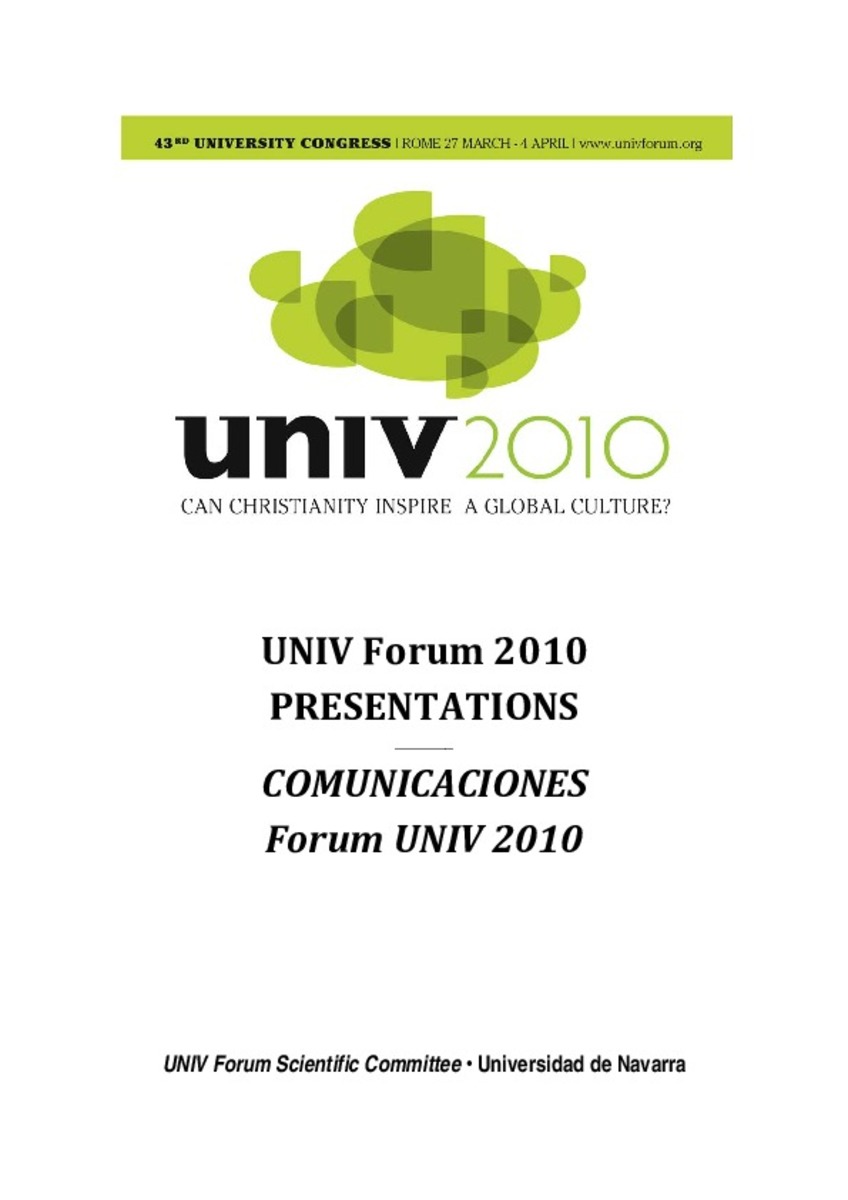Full metadata record
| DC Field | Value | Language |
|---|---|---|
| dc.creator | Sainz-de-Aja, F. (F.) | - |
| dc.creator | Otero, J. (J.) | - |
| dc.creator | Delgado, L. (L.) | - |
| dc.creator | Vargas, A.I. (Alberto I.) | - |
| dc.creator | Christe, I. (I.) | - |
| dc.creator | Lecanda, J. (Jon) | - |
| dc.creator | Rodríguez-Sedano, A. (Alfredo) | - |
| dc.date.accessioned | 2011-03-01T09:15:13Z | - |
| dc.date.available | 2011-03-01T09:15:13Z | - |
| dc.date.issued | 2010 | - |
| dc.identifier.citation | Sainz de Aja, F., Otero, J., Delgado, L., Vargas, A., Christe, I., Lecanda, J., Rodríguez Sedano, A. ""The day the music died. Una revaloración íntima del ocio en la juventud posmoderna"" En: UNIV Forum Scientific Committee, Can Christianity Inspire a Global Culture? UNIV Forum 2010 Presentations / ¿Puede el cristianismo inspirar una cultura global? Comunicaciones Forum UNIV 2010, Universidad de Navarra, 2010. Pags. 121-129 | es_ES |
| dc.identifier.isbn | 84-8081-208-7 | - |
| dc.identifier.uri | https://hdl.handle.net/10171/16766 | - |
| dc.description.abstract | Nowadays youth leisure is facing many challenges seeking a deep and true way to find the meaning of life and real happiness. Unfortunately most of the alternatives available push the youth to a sick leisure marked by self pleasure, and those that are willing to keep rowing upstream are forced to live a boring life and stay away from the addicting world. We would like to offer a Christian choice that could rescue the real meaning of leisure in the times with a classical thought. What would happen if today we were to meet with John Paul II and Seneca, in Piazza Navona, and over a cup of coffee chat about attractive alternatives that recover the real and transcendental leisure that makes life an exciting adventure? --------------------------- En esta ponencia se aborda el tema del ocio en la juventud contemporánea que en muchos casos está planteado en términos de evasión. A través de un diálogo entre un joven contemporáneo, Juan Pablo II y Séneca, intentamos poner de manifiesto que el cristianismo puede dar distintas soluciones al problema del ocio. También hemos utilizado el símil de Don Maclean en la canción American Pie, para darnos cuenta de que el ocio divertido y sano no ha muerto sino que está siempre ahí esperando que alguien lo reencuentre y lo vuelva a “poner de moda”. A todo esto concluimos que el ocio que propone el cristianismo no está pasado de moda y que tiene sentido en nuestra cultura actual. Con la visión cristiana el ocio trasciende convirtiéndose en una muy buena alternativa que ayuda al hombre a realizarse tanto como ser humano, como hombre. También nos hemos dado cuenta que necesitamos de jóvenes que con espíritu de sacrificio estén dispuestos a remar contracorriente dando testimonio de que es posible ser cristiano y ser verdaderamente joven y por tanto profundamente feliz. | es_ES |
| dc.language.iso | spa | es_ES |
| dc.rights | info:eu-repo/semantics/openAccess | es_ES |
| dc.subject | Ocio | es_ES |
| dc.subject | Juventud | es_ES |
| dc.subject | Juan Pablo II, Papa | es_ES |
| dc.subject | Séneca | es_ES |
| dc.subject | Cristianismo | es_ES |
| dc.title | The day the music died. Una revaloración íntima del ocio en la juventud posmoderna | es_ES |
| dc.type | info:eu-repo/semantics/article | es_ES |
Files in This Item:
Statistics and impact
Items in Dadun are protected by copyright, with all rights reserved, unless otherwise indicated.






